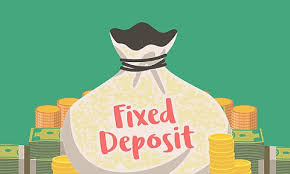Market linked investments face uncertainty with respect to returns owing to various economic conditions. Therefore investors need to look out for stable investment avenues to avoid high-risk perceptions. One such investment which has stood the test of time is fixed deposits. FD appeals more to a risk-averse investor looking for better returns or a senior citizen.

What is FD?
A fixed deposit is a financial instrument to invest your funds for a fixed period and earn interest at a higher interest rate than a savings account. It is considered as the safest investment with assured returns than any other investment instrument.
Interest Rate on FDs
The interest rate on a fixed deposit remains fixed. You are offered pre-decided interest rates on FD at which your funds earn interest. If you have invested in an FD at a higher interest rate, the returns will be unaffected by any change in market conditions. You do not have to worry even if your financial institution lowers down the rate of interest later. Your invested amount continues to earn interest as per the rates at which you have locked it.
Evaluating FD Interest Rates
The following are the factors taken into consideration to evaluate interest rate on Fixed Deposits:
1. The Economic Factor – Repo rates
Repo rate is the rate at which the banks borrow money from the apex bank of India – RBI. To improve economic conditions by liquidity in the economy, the apex bank has reduced the repo rate twice in the past few months. Such reductions in repo rate bring downward pressure on deposit rates, thereby bringing down FD interest rates. If you have a question that will FD rates increase in 2020 or not; then you should know that now there is a pause on the monetary rate cuts. The Repo rate is stable at 4%.
2. FD issuer Bank/Company
The interest rates depend on your FD issuer. It varies from issuer to issuer. Choosing the right FD issuer is a prerequisite to reaping higher returns. Banks and NBFCs offer FDs. Reputed NBFCs like Bajaj Finance offer higher interest rates than banks or post-offices.
3. Tenor of Investment
The interest rate depends on the tenor you have selected to lock-in your funds. The interest rate is affected by the tenor of an FD. The maximum tenor of an FD brings maximum returns. You should ask for special facilities offered by financial institutions for special tenors.
4. Investment amount
The amount invested in an FD account will also determine the applicable interest rate. Higher the amount, higher the returns. Most of the banks offer FDs for a minimum amount but there is no maximum limit to invest in FDs. Customers can start investing in Bajaj Finance FD with a nominal amount of Rs. 25,000 and can earn up to 7.35%.
5. Customer Category
Existing customers of a bank or company, senior citizens, super senior citizens receive interest at a higher rate. Age and category also affect the applicable interest rates. Bajaj Finance FD offers an additional interest rate benefit of 0.25% for senior citizens and an additional 0.10% for auto- renewal.
6. Mode of investment
Many banks and NBFCs offer an advantage on the rate of interest to the investors investing online. For example, with Bajaj Finance FD you can earn an additional 0.10% if you invest online.
7. Type of Fixed Deposit and Interest Frequency
You must have heard about the power of compounding. The Cumulative FD where interest compounded and paid at maturity earns higher returns than non-cumulative FDs where you have the option to receive interest monthly, quarterly, or annually.
The FD interest rates in 2020 have been between 4-6% because of the present economic scenario. Bajaj Finance FDs rates are up to 7.35%, which is one of the highest FD rates in India currently.




